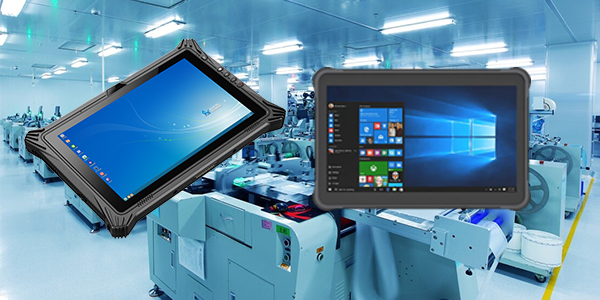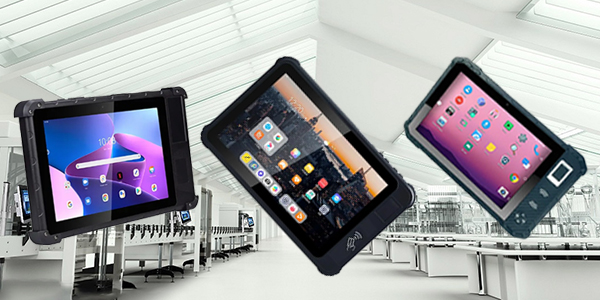With the IOT technology rapidly developing, all our businesses have begun to be connected in series, which also means that we need rugged mobile terminals to support application requirements in various environments. We have already known how to choose a rugged mobile terminal. But there is a new problem about how to maximize the advantages of a solid mobile terminal .
We all know the two most common operating systems currently existed on the market are Windows and Android. They all have similar but different features and benefits, so the use case requirements determine which operating system could achieve the best performance in the operational field, these requirements include I/O interface, security, performance, intended use, available budget and the number of concurrently running applications.
In this article, we will describe the pros and cons of both operating systems, and the industrial applications that are suitable for them.
Advantages of Windows Operating System
Windows has been developing for decades since its inception in the 1980s. With the rise of the Internet, the advantages of Windows have led many companies and industries to regard Windows as the mainstream operating system.
Below we will discuss some of the reasons why the Windows operating system become the choice of many businesses and industries as well as some of its drawbacks:
Powerful Performance in multi-tasking
Windows rugged tablets have a higher computing power, more memory and a powerful processor. The advantage of this is that, you can run several applications at one time ,without compromising the overall performance of the tablet. It is helpful in an industrial scenario where there are complex tasks being run and a lot of data is being processed.In addition, the Windows OS is robust enough to handle applications with comparable loads to gaming and intelligent video conferencing.
Compatibility with more devices
Windows devices in general tend to be compatible with most external devices, as they offer options for integration with third-party keyboards and mice, docking stations, printer, card reader and other hardware components.
This is convenient for users to add a new devices as per their needs ,without worrying about the compatibility to the window devices. Windows devices also have several USB ports to connect the external devices ,therefore the wireless connection options never be a necessary .
Variety of design options
Rugged Windows tablets come in different shapes, sizes and types. That means more options when looking for a tablet to meet your industrial needs.
Disadvantages of Windows Operating System
Although Windows tablets enjoy a robust, mature OS capable of performing nearly any task, users may not always require a powerful system.
Besides ,Windows tablets that have adequate features to meet industrial needs tend to be more expensive. It is easy to get a cheaper tablet pc however, the same functionality will be absent .
On the other hand, the high computing power of a Windows tablet will drain the battery faster, but this may not be a major issue if the tablet is installed in a dock with a fixed power supply.
The Advantages of Android OS
As we all know Android and Windows have similar features and functions, And Android operating system is an effective alternative in many cases, which makes Android operating system continue to gain attention in the rugged market.
Allows enterprise to tailor technical complexity based on their needs.
Customization is the most obvious advantage of Android. The threshold for releasing new applications is very low, and there is no need for a long review process. Those feature makes Google Play Store is more popular than Microsoft Store.
More cost-effective for Android terminal
Compared with the high cost of Windows, the price of Android tablets is obviously very affordable, but the low price does not mean that the tablet does not meet the necessary quality standards.
Android OS can be application-specific, promoting a customized architecture that reduces overall hardware costs. In addition, Android come with a significantly lower license fee.The combination of more flexible hardware options make the Android tablet a cost-effective solution by enabling developers to avoid platform-specific code specifications.
Affordable power consumption
While Windows OS implemented changes to extend battery life, Android generally uses less power and is more energy-efficient than Windows counterparts, because the ability of android to customize system architecture to its application. Lower power consumption reduces operating costs and extends the lifetime from a single battery charge during operation.
Google integration and open source
Android can integrate with Google Workspace easily, a common platform many users are already on. Seamless integration can tie the Android rugged tablet to cloud storage . Though Android may be slightly more susceptible to viruses than Windows, it carries the advantage of employing expandable memory to grow with the application.
Convenient to run various applications
Android tablets can access to many different applications, we can customize the software according to our needs, download and use it from Google Play store.
Disadvantages of Android Operating System
Even though the Android system is so good, there are still some unavoidable shortcomings:
Requires a third-party MDM tool:
Unlike windows tablets, Android tablets do not have an MDM tool embedded in the operating system. In order to manage the deployment of the devices, an MDM tool will have to be purchased from a vendor which leads to additional costs.
Limited periphery connection:
Android tablets do not have the variety of drivers to support connection of external devices. The number of ports available in Android tablets is also limited ,therefore you may have to depend on Wi-Fi or Bluetooth connections which sometimes fail to function.
Windows or Android Rugged Tablets: Which is suitable for you ?
The easiest way to consider which operating system to select is clarify how you will use the rugged tablet. If the client requires a simple, cost-effective solution that allows you to customize it to a specific use scenario easily, Android will be the better choice. The rugged Android tablet takes the simplicity of the smartphone and extends its applicability to a business-capable, efficient, cost-effective solution.
Windows is better for high performance, integrated with other systems and devices, prioritizing data integrity and device-managed security and flexibility in tablet design features. A rugged Windows tablet maintains the power, safety, and compatibility of a laptop while adding the agility and compactness of a tablet.
Post time: Feb-24-2023






